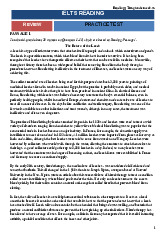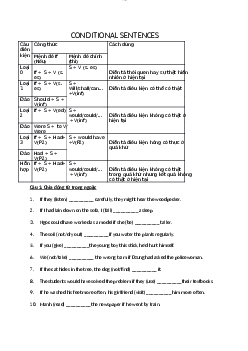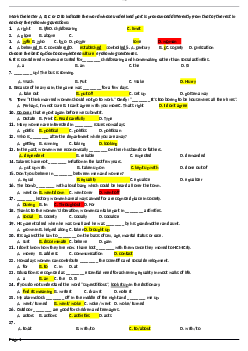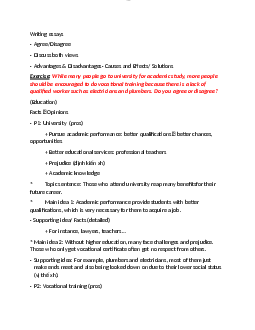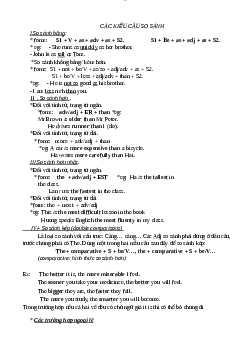



Preview text:
HỌ VÀ TÊN:……………………………… LỚP:……………………………………….
Bài 1: Chia động từ trong ngoặc
- She (not study) ………. on Saturday.
- He (have) ………. a new haircut today.
- I usually (have) ……….breakfast at 6.30.
- Peter (not/ study)……….very hard. He never gets high scores.
- My mother often (teach)……….me English on Saturday evenings.
- I like Math and she (like)……….Literature.
- My sister (wash)……….dishes every day.
- They (not/ have)……….breakfast every morning.
- .........you.........your aunt last week? (to phone)
- He.........milk at school. (not/to drink)
- The police.........two people early this morning. (to arrest)
- She.........to Japan but now she.........back. (to go - to come)
- Dan.........two tablets this year. (already/to buy)
- How many games.........so far this season? (your team/to win)
- .........the CN Tower when you.........in Toronto? (you/to visit - to stay)
- .........your homework yet? – Yes, I.........it an hour ago. (you/to do - to finish)
- There.........an accident in High Street, so we have to use King Street to get to yourschool. (to be)
- I.........Peter since I.........last Tuesday. (not/to see - to arrive)
- Frank.........his bike last May. So he.........it for 4 months. (to get - to have)
- I'm sorry, I.........earlier, but I.........a lot lately. (not/to write - to work)
Bài 2: Hoàn thành đoạn hội thoại sau bằng cách điền đúng dạng từ:
My cousin, Peter (have)………..a dog. It (be)………..an intelligent pet with a short tail and big black eyes. Its name (be)………..Kiki and it (like)………..eating pork. However, it (never/ bite)………..anyone; sometimes it (bark)………..when strange guests visit. To be honest, it (be)………..very friendly. It (not/ like)………..eating fruits, but it (often/ play)………..with them. When the weather (become)………..bad, it (just/ sleep) ………..in his cage all day. Peter (play)………..with Kiki every day after school. There (be)………..many people on the road, so Peter (not/ let)………..the dog run into the road. He (often/ take)………..Kiki to a large field to enjoy the peace there. Kiki (sometimes/ be)………..naughty, but Peter loves it very much.
Bài 3. Chọn đáp án thích hợp điền vào chỗ trống
1. Learning English
Every year students in many (1) .................................. learn English.
(2) .................................. of
these students are young children. Others are teenagers. Many are adults. Some learn at school, others study (3)
.............................. themselves. A few learn English just by (4) .................................. the language in
films, (5) ........................................ television, in the office, or among their friends. But not many are
lucky to do that. Most people must work (6) .................................. to learn another language.
Learning another language! Learning English! Why do all these people want to learn English? It is (7)
..................................to answer that question. Many boys and girls learn English at school because it is one of their subjects. Many adults learn English because it is (8) .................................. for their work.
Teenagers often learn English (9) .................................. their higher studies, because some of their book
are in English at the college or University. Other people learn English because they want to read newspapers or magazines (10) ........................ English.
1a. countries/ b. homes/ c. house/ d. families
2.a. None/ b. Some/ c. Any/ d. All
3.a. for/ b. with/ c. by/ d. on/
4.a. hear/ b. heard/ c. to hear/ d. hearing
5.a. on / b. at/ c. in / d. to
6.a. hardly/ b. hard/ c. easy/ d. easily
7.a. horrible/ b. cold/ c. difficult/ d. careful
8.a. use/ b. used/ c. useful/ d. useless
9.a. for/ b. with/ c. to/ d. of
10.a. for/b. with/c. to/d. in
2. Learning a second language
Some people learn a second language (1) ..................................Other people have trouble learning a
new language. How can you help (2) .................................. learn a new language, such as English? There are several ways to make learning English a little (3) .................................. and more interesting.
The first step is to feel positive about learning English. If you believe that you can learn, you will learn. (4)
.................................. patient. You do not to have to understand (5) .................................. all at once.
It’s natural to make mistakes when you learn something new. We can learn from our mistakes.
The second step is to practice your English. For example, write in a journal, or diary, everyday. You will get
used to (6) ..................................in English, and you will feel comfortable expressing your ideas in
English. After several weeks, you will see that your writing is improving. (7) .................................. you must speak English every day. You can practice with your classmates (8) .................................. class.
The third step is to keep a record of your language learning. You can write this in your journal. After (9) .................................. class, think about what you can did. Did you answer a question (10)..................................? Did you understand something the teacher explained? Perhaps the lesson was difficult, but you tried to understand it. It is important to practice every day and make a record of your achievements.
1.a. ease/ b. easy/ c. easily/ d. all a, b, c
- a. itself/ b. yourself/ c. himself/ c. correctly
- a. ease/ b. easy/ c. easily/ d. herself
- a. be/ b. being/ c. to be/ d. easier
5.a. anything/ b. nothing/ c. everything/ d. something
6.a. write/ b. writing/ c. to write/ d. written
 7.a. In addition/ b. Addition/ c. Additional/ d. By addition
7.a. In addition/ b. Addition/ c. Additional/ d. By addition
8.a. of side/ b. outside/ c. beside/ d. by side
9.a. some/ b. each/ c. all/ d. few
10.a. correct/b. correction/d. corrective
Bài 4: Viết lại câu hoàn chỉnh
Eg: They / wear suits to work? =>Do they wear suits to work?
- she / not / sleep late at the weekends =>________
- we / not / believe the Prime Minister =>________
- you / understand the question? =>________
- they / not / work late on Fridays =>________
- David / want some coffee? =>________
- she / have three daughters =>________
- when / she / go to her Chinese class? =>____
- why / I / have to clean up? =>_______
Bài 5. Viết đoạn văn kể về một câu chuyện đáng nhớ nhất trong cuộc đời bạn
(khoảng 150 từ)
………………………………………………………………………………………………
………………………………………………………………………………………………
………………………………………………………………………………………………
………………………………………………………………………………………………
………………………………………………………………………………………………
………………………………………………………………………………………………
………………………………………………………………………………………………
………………………………………………………………………………………………
………………………………………………………………………………………………
………………………………………………………………………………………………
………………………………………………………………………………………………
………………………………………………………………………………………………
………………………………………………………………………………………………
………………………………………………………………………………………………
………………………………………………………………………………………………
………………………………………………………………………………………………
………………………………………………………………………………………………
………………………………………………………………………………………………
………………………………………………………………………………………………
………………………………………………………………………………………………
………………………………………………………………………………………………
………………………………………………………………………………………………
………………………………………………………………………………………………
………………………………………………………………………………………………
